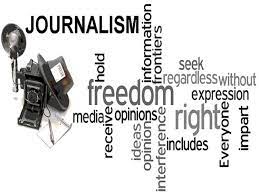
Unveiling the Power of Unbiased Journalism: Illuminating Truth and Empowering Society
Unbiased Journalism: The Pillar of a Well-Informed Society
In an era of information overload and conflicting narratives, unbiased journalism stands as a beacon of truth and objectivity. It serves as the bedrock of a well-informed society, providing citizens with the necessary tools to make informed decisions and engage in meaningful discourse.
Unbiased journalism is characterized by its commitment to presenting news and information without favoring any particular agenda or interest. It is rooted in the values of accuracy, fairness, and impartiality. Journalists who adhere to unbiased reporting strive to separate facts from opinions, presenting multiple perspectives on a given issue while maintaining a neutral stance.
The importance of unbiased journalism cannot be overstated. In a world where news travels at lightning speed through various platforms, it is crucial to have reliable sources that provide verified information free from manipulation or bias. Unbiased journalists act as gatekeepers, ensuring that the public receives accurate and trustworthy news.
Unbiased journalism fosters transparency and accountability. By holding those in power to scrutiny, journalists play a vital role in promoting good governance and safeguarding democracy. They act as watchdogs, uncovering corruption, exposing wrongdoing, and bringing important issues to light.
Moreover, unbiased journalism encourages critical thinking among readers. By presenting diverse viewpoints and providing context, it enables individuals to form their own opinions based on a comprehensive understanding of the subject matter. This empowers citizens to engage in constructive dialogue and make informed decisions about matters that affect their lives.
However, achieving true unbiased journalism can be challenging. Journalists are human beings with their own beliefs and biases. Recognizing this inherent subjectivity is essential for journalists committed to unbiased reporting. They must constantly evaluate their own perspectives and strive for fairness in their coverage.
To maintain integrity in their work, unbiased journalists rely on rigorous fact-checking procedures and seek multiple sources before publishing stories. They prioritize accuracy over sensationalism or personal agendas. They also make an effort to include diverse voices and perspectives, ensuring that their reporting reflects the complexity of the world we live in.
As consumers of news, it is our responsibility to support unbiased journalism. By seeking out reliable sources and critically evaluating the information we encounter, we can contribute to a healthier media landscape. It is essential to be aware of our own biases and be open to considering different viewpoints, even if they challenge our preconceived notions.
Unbiased journalism is not an unattainable ideal; it is a necessary pillar of a well-functioning society. It empowers citizens, promotes accountability, and cultivates an informed electorate. By supporting unbiased journalism, we invest in the future of democracy and ensure that truth prevails over misinformation and propaganda.
In conclusion, unbiased journalism serves as a vital force in today’s media landscape. Its commitment to truth, fairness, and impartiality provides society with the tools needed to navigate complex issues and make informed decisions. As consumers of news, let us champion unbiased journalism as a cornerstone of an enlightened society.
Exploring Unbiased Journalism: Answers to 5 Common Questions
- How can I find unbiased journalism?
- What is the definition of unbiased journalism?
- How can I tell if a news source is unbiased?
- Why is unbiased journalism important?
- What are some examples of unbiased journalism?
How can I find unbiased journalism?
Finding unbiased journalism can be a challenging task in today’s media landscape, but with a few strategies, you can increase your chances of accessing reliable and unbiased news sources. Here are some tips to help you in your search:
- Diversify Your Sources: Relying on a single news outlet can limit your exposure to diverse perspectives. Explore a variety of sources, including both traditional and digital media platforms. Look for reputable newspapers, established broadcast networks, and well-known news websites that have a track record of ethical journalism.
- Fact-Check and Verify: Cross-check the information you come across by consulting multiple sources. Independent fact-checking organizations like FactCheck.org, Snopes, or PolitiFact can help identify misinformation or biased reporting. Be cautious of relying solely on social media or unverified websites for news.
- Evaluate the Editorial Policy: Investigate the editorial policy of the news outlet you are considering. Look for transparency in how they handle conflicts of interest, disclose funding sources, and separate news reporting from opinion pieces. A commitment to journalistic ethics is an important indicator of unbiased reporting.
- Assess Reporting Methods: Unbiased journalism relies on thorough research, fact-checking, and balanced reporting. Look for articles that cite multiple sources, provide evidence-based information, and present different perspectives on complex issues.
- Consider Journalists’ Expertise: Research the background and experience of journalists who contribute to a particular news outlet or article. Experienced journalists often bring credibility to their work through their expertise in specific subject areas.
- Avoid Sensationalism and Clickbait: Be wary of headlines or articles that use sensational language or make extreme claims without substantial evidence. Unbiased reporting tends to focus on presenting facts rather than resorting to sensationalism to attract attention.
- Seek Out Nonprofit News Organizations: Nonprofit news organizations often prioritize public interest over profit motives and may have a greater commitment to unbiased reporting. Examples include ProPublica, The Center for Public Integrity, or The Marshall Project.
- Engage in Media Literacy: Develop critical thinking skills to evaluate news stories effectively. Be aware of your own biases and be open to considering different perspectives. Fact-check information before sharing it with others, and be cautious of echo chambers that reinforce pre-existing beliefs.
Remember, no news source is entirely free from bias, as journalists are influenced by their own experiences and perspectives. However, by following these strategies and being an active consumer of news, you can navigate the media landscape more effectively and find sources that prioritize accuracy and impartiality.
What is the definition of unbiased journalism?
Unbiased journalism refers to the practice of reporting news and information in a fair, impartial, and objective manner. It involves presenting facts and events without favoring any particular agenda, interest, or personal bias. Unbiased journalists strive to provide a comprehensive view of a topic by presenting multiple perspectives and allowing readers to form their own opinions based on accurate and reliable information. The goal of unbiased journalism is to promote transparency, accountability, and informed decision-making among the public.
How can I tell if a news source is unbiased?
Determining the unbiased nature of a news source can be challenging, especially in an era where misinformation and biased reporting are prevalent. However, there are several strategies you can employ to assess the credibility and objectivity of a news source:
- Multiple sources: Rely on multiple sources to gather information about a particular event or topic. Compare how different news outlets report on the same subject. If multiple reputable sources with varying perspectives present similar facts, it increases the likelihood of unbiased reporting.
- Fact-checking: Engage in fact-checking by verifying the information presented in a news article through independent fact-checking organizations such as Snopes, FactCheck.org, or PolitiFact. These organizations evaluate claims made by various news sources and provide objective assessments.
- Transparency and accountability: Look for transparency in how a news organization operates. Reputable sources often have clear editorial policies, disclose their funding sources, and provide avenues for readers to offer feedback or file complaints. They also issue corrections when errors are identified.
- Journalistic standards: Assess whether a news source adheres to basic journalistic standards such as accuracy, fairness, and balance. Unbiased reporting should present facts supported by evidence and include diverse perspectives without favoring any particular agenda.
- Opinion vs. news: Differentiate between opinion pieces and straight news reporting within a publication or website. Opinions are subjective by nature, but they should be clearly labeled as such to avoid confusion with factual reporting.
- Watch for sensationalism: Be cautious of sensationalized headlines or articles that use emotionally charged language or exaggerations to grab attention. Unbiased reporting tends to rely on factual information rather than relying on sensationalism.
- Track record: Consider the reputation and track record of the news source over time. Established outlets with a history of accurate reporting are generally more reliable than newly established or obscure sources.
- Bias awareness: Recognize that complete objectivity is challenging, as journalists are human beings with their own perspectives. Look for news sources that acknowledge their potential biases and make an effort to present balanced reporting.
By employing these strategies, you can become a more discerning consumer of news and better assess the unbiased nature of a news source. Remember that no single source is entirely free from bias, but by seeking out multiple perspectives and critically evaluating the information presented, you can make more informed judgments about the credibility and objectivity of a news outlet.
Why is unbiased journalism important?
Unbiased journalism is important for several key reasons:
- Fostering an informed society: Unbiased journalism serves as a reliable source of information, enabling individuals to stay informed about local, national, and global events. It provides citizens with the knowledge necessary to participate meaningfully in public discourse, make informed decisions, and engage in democratic processes.
- Promoting critical thinking: Unbiased journalism presents multiple perspectives on a given issue, encouraging readers to think critically and form their own opinions based on a comprehensive understanding of the subject matter. By providing diverse viewpoints and context, unbiased journalism empowers individuals to engage in constructive dialogue and make well-rounded judgments.
- Holding power accountable: Unbiased journalism acts as a check on those in power by uncovering corruption, exposing wrongdoing, and bringing important issues to light. It plays a crucial role in promoting transparency and accountability within governments, institutions, and other influential entities.
- Countering misinformation: In an era of rapid information dissemination through various channels, unbiased journalism serves as a bulwark against misinformation and fake news. By adhering to rigorous fact-checking procedures and relying on verified sources, unbiased journalists provide accurate information that helps combat the spread of falsehoods.
- Preserving trust in media: Unbiased journalism is essential for maintaining public trust in the media industry. When journalists report objectively without favoring any particular agenda or interest, they demonstrate their commitment to the truth and reinforce their credibility as reliable sources of information.
- Nurturing democracy: Unbiased journalism is indispensable for the functioning of democratic societies. It enables citizens to hold their elected representatives accountable by providing them with accurate information about policies, actions, and decisions that affect their lives. Informed citizens are better equipped to participate actively in democratic processes such as voting or engaging with public debates.
- Encouraging social cohesion: Unbiased journalism plays a vital role in promoting understanding among diverse communities by presenting different perspectives and facilitating dialogue. It helps bridge gaps in society, fostering empathy, and promoting a sense of unity by highlighting common ground and shared experiences.
In summary, unbiased journalism is important because it fosters an informed society, promotes critical thinking, holds power accountable, counters misinformation, preserves trust in media, nurtures democracy, and encourages social cohesion. By upholding the principles of accuracy, fairness, and impartiality, unbiased journalism serves as a cornerstone of a healthy and vibrant democracy.
What are some examples of unbiased journalism?
There are several news organizations that strive to uphold the principles of unbiased journalism. Here are a few examples:
- Reuters: Recognized globally for its commitment to impartiality, Reuters is known for its fact-based reporting and adherence to journalistic ethics. It aims to provide unbiased news coverage across a wide range of topics, from politics and economics to social issues and culture.
- Associated Press (AP): The AP is a renowned news agency that operates worldwide, delivering unbiased news content to media outlets around the globe. Its reputation lies in its emphasis on accuracy, objectivity, and comprehensive reporting.
- BBC News: The British Broadcasting Corporation (BBC) is widely respected for its commitment to impartial journalism. As a public broadcaster, it strives to present multiple perspectives on various issues while maintaining editorial independence.
- The Guardian: While no news organization is entirely free from bias, The Guardian has gained recognition for its efforts in providing balanced reporting and diverse viewpoints. It covers a wide range of topics with an emphasis on investigative journalism and in-depth analysis.
- PBS NewsHour: PBS NewsHour is a television program that offers in-depth analysis of current events from an unbiased standpoint. With its focus on providing context and presenting different viewpoints, it aims to foster informed public discourse.
It’s worth noting that even these examples may face criticism or accusations of bias from various perspectives at times. Unbiased journalism is an ongoing pursuit rather than an absolute achievement, but these organizations have established reputations for striving towards objectivity and fairness in their reporting.



